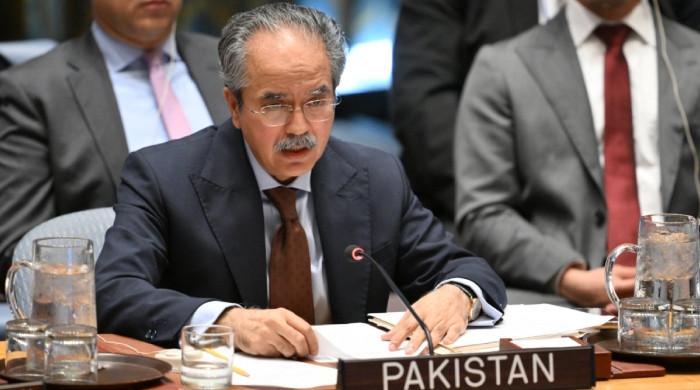- Indian acts threaten millions’ livelihoods: Pakistani envoy.
- Pakistan says such acts set precedent for “coercion elsewhere”.
- Expects India to return to compliance after arbitration court’s ruling.
Pakistan on Friday denounced India’s unilateral and illegal suspension of the Indus Water Treaty (IWT), urging the global community to prevent the “weaponisation” of shared natural resources.
India held the IWT — which split the Indus and its tributaries between the two countries and regulated water sharing — in abeyance in April after 26 civilians were killed in Indian Illegally Occupied Jammu and Kashmir (IIOJK).
New Delhi blamed Pakistan without providing concrete evidence, a charge Islamabad denies.
Speaking at a UN Security Council meeting, Pakistan’s UN Ambassador Asim Iftikhar Ahmad said that the “deliberate weaponisation of shared natural resources” risked weakening confidence in international water law.
Such acts also set a precedent for “resource-based coercion elsewhere”, he added.
Ambassador Ahmad stated that India’s unilateral action on the IWT was a “textbook example” of deliberate weaponisation of shared natural resources.
“For more than six decades, this Treaty has stood as a model of cooperation, ensuring equitable and predictable sharing of the Indus Basin’s waters between Pakistan and India, even in times of war,” he said.
Ambassador Ahmad said that New Delhi’s decision to suspend IWT not only threatened ecosystems but also endangered the lives of millions who depended on the Indus River.
He added that India’s unilateral actions should be a matter of serious concern for the UN and the international community as a whole.
Islamabad has maintained that the IWT is a binding international agreement brokered by the World Bank and contains no provision for unilateral suspension.
Political and military leaders have repeatedly said that India’s attempt to block river water flowing to Pakistan will be considered “an act of war”.
In June this year, the Permanent Court of Arbitration sided with Pakistan in the dispute, ruling that India could not unilaterally suspend the accord.
The unanimous judgement, dated June 27, confirmed that India’s decision to place the Treaty in abeyance had no bearing on the Court’s competence to adjudicate the matter.
In his address at the UN Security Council, Ambassador Ahmad said that Islamabad expected India to return to compliance and normal functioning, following the arbitration court’s ruling.
Ambassador Ahmad also urged for an early and swift resolution to global conflicts to minimise their environmental impacts and climate driven security risks.
In this regard, he called for the integration of environmental considerations into UN peace operations and political missions.


